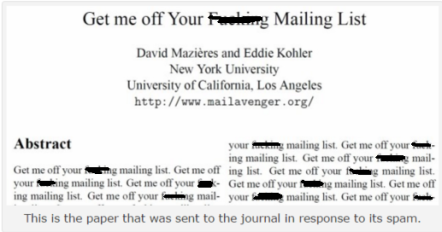. . .
– Sincerely, a student… –
The pains of a student: Sourcing for information only to find out you need to pay for it. Buying the resource and finding out that it doesn’t contain the information you need.[1]
If open access(OA) was available, people would have access to information that could literally improve their lives. Farmers will be able to increase their crop yield and students would be able to obtain valuable information to help you with your studies.[2] Here’s a quote from Mark Zuckerberg, founder of Facebook.
If you’re into business, you might wonder… how can OA publishers make money if there is no paywall? There is no subscription fees and how can they cover the cost of publication? It might even discourage researchers from going OA! Worry not, OA helps to open the gates to a much wider audience. An increased number of readers may result in an increased number of citations for the author.[3]
When more people know about the author, it will lead to an increased viewership to your site. Remember when we talked about digital footprints? Everything you post, everything you do has commercial value to companies or someone.[4] Marketers especially love such information and can easily cater advertisements that interest you. It’s a trade-off at the expense of your own information. Here’s an example of an open access publisher.
Indeed, quality might be affected as a result of OA. Some publishers have to cover cost and they do so by publishing more articles which may affect quality.[3] But that doesn’t stop sites like Wikipedia. If you think about it, does money = quality? When you did your research, you may come across multiple authors talking about the same topic and criticizing one another. Quality is very subjective. But based on research on the number of citations, it shows that OA has an advantage in Physics publications.[5]
OA also helps researchers in developing countries gain access to information and provide an opportunity for them to participate in international research committees.[3]
Another issue for OA is the possible damage to peer reviews systems, diminishing the overall quality of scientific journal publishing.[3] An example includes a hoax publication.[6]
To conclude, there are pros and cons to OA. Some examples show the clear advantages of it benefiting developing countries while some disadvantages show a lack in quality or peer review. As we shift towards a digital age, information is everywhere and easily available. Even big corporations like Facebook is embracing OA as shown in the following video. So what is your take on OA?
(437 words)
References:
[1] Piled Higher and Deeper (2012, 4:30) – Open Access Explained!
[2] xpatnation.co (2014) – Zuckerberg spreading the knowledge economy
[3] edanzediting.com (2013) – Advantages and Disadvantages of Open Access
[4] webroot.com (n.d.) – How Do Free Websites Make Money?
[5] eprints.soton.ac.uk (2004) – Comparing the Impact of Open Access (OA) vs. Non-OA Articles in the Same Journals
[6] scholarlyoa.com (2014) – Bogus Journal Accepts Profanity-Laced Anti-Spam Paper
Image References:
Giphy.com – http://giphy.com/gifs/hannibal-lecter-gif-CijAeMAbifeXS
xpatnation.co (2014) – http://xpatnation.co/zuckerberg-spreading-the-knowledge-economy/#.J73Z26h9H
Internet.org (2013) – Making the Internet Affordable
vocativ.com (2015) – http://www.vocativ.com/
eprints.soton.ac.uk (2004) – Comparing the Impact of Open Access (OA) vs. Non-OA Articles in the Same Journals
scholarlyoa.com (2014) – Bogus Journal Accepts Profanity-Laced Anti-Spam Paper






Hi Kai Yuan!
I am pleased to read your post which covered a wide scope of OA (Open Access). You have very sufficient and insightful research to back the comparison of OA versus Non-OA. Quality is indeed subjective and money doesn’t necessarily equate to quality.
You have one excellent point that I hadn’t thought of: how OA helped in developing countries. With poverty, we have to be mindful that costly research is unaffordable, thus certain online material will not reach developing countries. Having OA is akin to opening up towards them and encouraging their participation in international research.
Now I truly understand the fire that fuels the online petition for OA: White House Petition on Open Access by Sparc, Promoting Open Access Worldwide by EFF Action, etc. Check them out too!
To me, OA is really beneficial. However, personally I’d like to know, will you produce content that you worked so hard for and publish on the Internet at your own cost?
Thank you! 🙂
(163 words)
LikeLiked by 1 person
Hi Crystal,
Thanks for stopping by :). I’m glad my post had helped. I personally feel that Open Access(OA) will definitely benefit the world as a whole. Like what Mark Zuckerberg has mentioned, “We’re living in a knowledge economy”, and that little bit of information can go a long way for some people. The many advantages of OA is too much to ignore.
However in reality, publishers need to earn revenue in order for them to continue publishing. I’m sure as time passes, big corporations like Google or Facebook would probably have a plan and help make OA possible. (Seeing how Mark Zuckerberg already has some idea on it.)
Relating to your question, the answer will be yes. Now that we are living in a digital age, our work/information can be easily accessed online. You can translate that to viewership/followers/subcribers. For example, Youtube is one of the platforms that allow people to post videos they have made. I’m sure that those famous Youtubers definitely started somewhere and posted their content for free. It’s like a beginning for everybody, and from there you slowly grow.
I hope this answers your queries and i’m glad my post helped 🙂
-Kai
LikeLike
Hi Kai Yuan,
Interesting and informative point you made on the fact that offering open access of information opens the gate to a wider audience, leading to increased viewership, which ultimately increases the commercial value for themselves.
Additionally, you mentioned about how quality is affected as a result of OA (publishers rush authors to increase their publications in order to cover costs) – I fully agree to that as poor quality of published work might tarnish the reputation of the content producers themselves.
With regards to your question – “There is no subscription fees and how can they cover the cost of publication?” – well fret not, as open access funding from various institutions are present to aid in the publication cost that content producers might incur!
However so, the funding may not cover the full publication costs for researchers, and there might be limitations to qualify for the funding. You may find this page useful for more insights! (http://www.springer.com/gp/open-access/open-access-funding)
Hope that it helps in your understanding! 🙂
LikeLiked by 1 person
Hi Venezia,
Thanks for stopping by :). Glad my post helped. Indeed quality is very subjective, what is considered bronze to someone can be gold to another. Thank you for sharing about springer, i definitely learnt something new! I never thought about other ways to fund authors from that angle. From the video, it shows that they are also doing their best to make Open Access (OA) available to all parts of the world and that puts a smile on my face. Having in place a few different ways for authors to be funded really encourages them to produce more articles for people to read.
But as a starter for other publishers, they may think along the lines of advertisements. This also helps to cover publication costs. Some examples include, Vice or Vocativ. It’s the game of how many viewers/subscribers you have. However, in my reflection i have noted that there are problems such as adblockers and you may find this infographic particularly interesting as it might affect us in future as marketers. Click here to find out more!
I hope this answers your queries and i’m glad my post helped! 🙂
-Kai
LikeLike
Pingback: Review: Let’s Be Open About… | Crystal Moh Writes
Hi Kai Yuan!
It is enjoyable to read your post which is similar to mine. Compared to mine, there is some different points in your post. On top of that, I believe that most of our ideas is that OA should be accessible by everyone with no paywalls. I think it would definitely benefit a lot of people do their research and self-learning. If all documents required a paywall, I believe that the library will be filled with people waiting to get a glimpse of that book.
Even though OA is able to benefit a lot of people as it can help with citations and student references. But quality of it will be compromised. Thus, companies invented paywall so that they will be able to earn money for better research and reviews by journals. If all documents are built with a paywall, we will need to pay for all in order to find useful and correct files.
However, I don’t understand a point about how does OA benefit farmers in their crops? Do you mean that they will be able to go online to search for information regarding their crops?
In my opinion, I like OA a lot as I can find documents I wanted online along with music pieces provided free by musicians!
Regards,
Chan Wan Chyng
LikeLike
Hi WanChyng,
Thank you for dropping by :). Glad my post could be of help. Indeed, Open Access (OA) has a lot of benefits and at the same time it comes at a price. Quality itself is very subjective. You may come across multiple researchers/authors talking about the same topic, constantly criticizing one another and producing almost the same content. Some articles that you pay for, doesn’t even contain the information you need and there is no refund for that. (Really s***y for a student if that happens.)
However, regarding the research, you may refer this link to find out more about the problems regarding OA. Government funds universities to do research and while the university gives the copyright and articles to publishers for free, publishers then force people to pay for something that may not even justify it’s quality.
Regarding the farmers, given that there is OA content, farmers can have access to more in-depth knowledge on how to go about growing their crops. Not just the step by step Wiki or the Yahoo Answers!. It’s more of detailed information on Agriculture, like how a farmer can improve the quality of the soil, when are the appropriate seasons to start planting, how to prevent insects from ruining your crops without using pesticide. Its in-depth information like this that is not easily available. As you may know, traditional methods may not always be the best. Having access online to such information for free (probably at a community computer lab/school) will definitely benefit them.
To me, i like OA for the videos it provides like on Youtube and the games too!
I hope this answers your queries and i’m glad my post helped! 🙂
-Kai
LikeLike
Pingback: Reflection Time! – Should one provide open access of information? | venezia tay